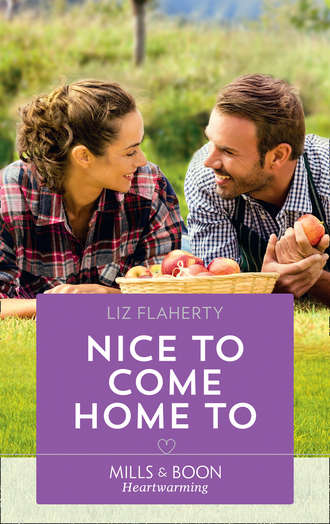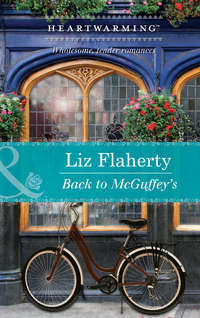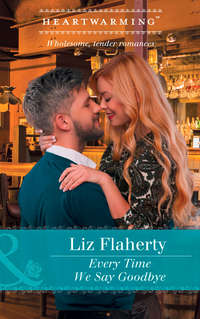
Полная версия
Nice To Come Home To
Royce’s hand brushed her shoulder in a pat. “Bad overwhelming or good overwhelming?”
Cass laughed, surprised at the sound. And a little pleased with herself. Her life was okay in a lot of ways. She was successful in her field. She’d survived breast cancer and divorce. But she didn’t usually laugh much. It felt good.
When they pulled into the orchard driveway after turning around near the crosses, the wagon was all set for the hayride. Two pretty horses were anxious to get going. A young Amish man, his clean-shaven face announcing his bachelorhood, was on the driver’s seat. Another young man, bearing a marked resemblance to Luke Rossiter, sat beside him.
“Sorry we’re late,” said Cass, joining Luke at the back of the wagon. “I was daydreaming and missed the turn. This is my sister, Royce.”
“Royce.” Luke shook hands with her. “That’s Isaac Hershberger and my brother, Seth. The wagon’s going to be almost full of a 4-H group from near Kokomo. There’s room for you, Royce, if you want to go, but your sister and I are going to take the motorized tour.”
“I don’t know.” Royce wasn’t normally shy, but she looked uncomfortable. “Maybe I should just wait here. I won’t be in the way.”
Seth jumped down from the driver’s seat and came around. “If you’ll come along, I’ll ride in the back with you. Mary Detwiler will sit up front with Isaac and they’ll pretend they’re not going out.”
Isaac turned in his seat, smiled a greeting at Cass and Royce and tossed his flat-brimmed hat at Seth.
“Come on.” Luke urged Cass in front of him. “They’ll settle down once the passengers are on board.” He waved at his brother. “‘Settle down’ might be the wrong way to say it—they’ll entertain them. How’s that?”
He led the way to the utility vehicle on the other side of the orchard truck. “Do you want some coffee to take along? It’s always fresh inside the store.”
“That would be good.”
A few minutes later, they were back on the four-wheeler. “There are sixty acres here, as you probably know,” he began, starting down one of the wide paths between the rows of trees. “We have nearly a hundred different varieties of apples, plus a few acres of pears, cherries and plums. We also have some grapevines. Chris Granger, from Sycamore Hill Vineyard and Winery, is helping with those and eventually we hope to serve and sell wine. We already sell all kinds of jams, jellies and honeys on consignment.”
“I’m surprised,” Cass admitted. “I thought it was more or less a hobby farm. I know the income was more substantial than I expected when I inherited, but I had nothing to compare it to.” Nor had she paid much attention. She’d put the monthly checks in the bank, uncomfortable with receiving money she hadn’t earned. The cumulative amount had made her accountant raise her eyebrows.
“We’ve expanded quite a bit. The apple barn closes in January, but we’re hoping to keep the store open this year with the consigned items.”
Something in his voice jarred a distant and sweet memory. “Dumplings. Do you have apple dumplings? I remember Aunt Zoey making them when I’d visit during the summer when I was little. They were like bowls filled with heaven.”
“We do have them, although Mrs. Detwiler and a few other Amish women make them for us now. Zoey had a class and taught them all how she does it.”
Cass peered at the structures. The climate-controlled storage barn stood apart. She was almost certain it had been built since the last time she was here. The retail store was in the apple barn. The round barn seemed to be waiting to be used. “Have you thought of putting a restaurant here?”
He nodded. “Zoey’s always wanted to, but Miniagua’s not big enough to support another one. There’s already a café, a bar and grill, a pizza place and a tearoom on the lake, plus we’re a few miles from there so it would be out of the way for nearly everyone. The tearoom doubles as an event center. So does the lake clubhouse and even the country club if you’re in the mood for some exclusivity.”
“What about a coffee shop?” Cass didn’t know anything about restaurants or demand for them, but she did know coffee shops. Most of Cassandra G. Porter’s Mysteries on the Wabash series had been written in them.
Luke looked thoughtful. “There used to be one in Sawyer, but the owners weren’t big on either cleanliness or quality—or paying their utilities, for that matter—so it didn’t last long.”
Cass gestured with her empty cup. “You have a good start with this. It’s good coffee.” She was almost sure it was the same kind she’d found in the house.
“The bulk foods store sells it.”
“You could serve those apple dumplings. Maybe have a limited breakfast and lunch menu.”
“It’s worth some thought. Summer people might like it. I’m not sure lakers would care one way or another, but it could be worth its while with summer traffic, I imagine—although the location might still be a problem.” He didn’t sound especially encouraging, but he didn’t give an unequivocal no, either.
They pulled up at the barn the same time as the hay wagon did. The group of 4-H club members climbed out the back and went into the store, waving at the young people on the driver’s seat. Seth and Royce were the last ones off the wagon. Royce ran to where Cass and Luke were getting out of the utility vehicle.
“Seth says I can help pick apples. Can I? Isaac and Mary are going to help, too. He says they’re picking the Earligolds now. I promise I won’t get in the way.”
Cass looked at Luke. He shrugged. “A dollar an hour over minimum wage. Keep track of your hours and do what Seth says. Fill out your paperwork in the office after work today. Be careful. If you fall out of a tree, Zoey will have my head and it would increase the possibility I might have to climb one.”
“What are you going to do for lunch?” Cass protested. “You can’t go two hours without eating, much less the rest of the day.”
“I will bring enough for Royce if it’s all right.” Mary’s English was lightly accented, and Cass remembered the musical sound of the Pennsylvania Dutch the Amish often spoke. “She can bring lunch for me tomorrow.”
“Well then, sure, if you want to, Royce. Thank you, Mary.” Damaris had been concerned about the influence of some of Royce’s friends in California. Cass had a feeling she’d be pleased with Mary, Isaac and Seth. At least on the face of things.
“If you’ll come to Zoey’s with me,” said Luke, when the teenagers had gone to work, “we’ll get a good lunch plus she and I can explain how the business is run. She still knows more about the orchard than I do. It’s up to you how active you want to be, but you need to make an educated decision.”
“I don’t think Aunt Zoey wants to see me.”
His gaze went to the round barn, then flicked back to her. He took off his baseball cap, pushed back his thick brown hair and put the cap back on. “Based on what?”
“What?” She frowned. What was he talking about?
“Yes, what? What makes you believe that?”
“My mother told me, although what she said turned out to be not exactly true. But the year in high school when I lived here, Zoey didn’t want me to come even though I didn’t have anywhere else to go. And I hardly ever saw her when I was here.” That still stung. Her aunt had been her favorite person in all the world. Finding out the feeling wasn’t mutual had hurt.
“Even if that’s true—and I know Zoey well enough to think there’s more to the story than you’ve been told—would you seriously hold that kind of grudge for, what, twenty years?”
“It’s not a grudge,” she protested. “I love Aunt Zoey. Having her come out to California when Mother was ill and again when she died was what got me through those days.” She hesitated. Talking about her personal life wasn’t something she did, especially with stomach-clenchingly handsome men she hardly knew. “I had divorced parents and numerous stepparents whose revolving-door comings and goings made me relationship shy. My father and some of those stepparents were military—not that there’s anything wrong with that, but it makes for a complicated lifestyle. Add my own shockingly bad choices to the mix and you have someone who stays inside a shell because it’s comfortable there.”
“I’m sure it is.” He touched her arm, leading her away from customer traffic. “Did you like it here? In high school, I mean.”
“Like it?” She shook her head. “I loved every minute, I think.” She frowned. “Did you live here then? I don’t remember you, but I wasn’t here that long.”
“No. My folks transferred here from Pennsylvania long after I got out of high school. Dad worked in Kokomo, but they lived in Sawyer. I liked it so well that when life dictated a change, I got a job as close as I could and bought a fixer-upper on the lake. About the time I got the kitchen paid for, the company I worked for closed. I’ll go back to real work one of these days, but for the time being, I’m enjoying the orchard and the lake.” He stopped. “I just told you my entire life story in what I’m sure was less than a hundred words. Are you impressed so far?”
She laughed, the sound coming easily. “You know, I am.”
“Impressed enough to come to Zoey’s with me? If it doesn’t work out and you have to spend an hour making polite noises, will it really hurt anything?”
Images of her last conversation with her father, facing Tony in court the day their divorce was final and watching cancer claim her mother made a painful collage in her mind. So many things that couldn’t be unsaid or undone. Maybe, just maybe, the fissure with Aunt Zoey could be healed. “No. It won’t hurt a thing. I’ll be glad to go with you.”
“You up for a walk?”
She was. She fell into step beside him to go down a grass-divided lane to the big house that sat watch over the orchard. “I’d forgotten that everyone walks at the lake. Or rides bikes or golf carts.”
“Or all three. Where did you live in California? Not where, exactly, but how? Were you in a house or an apartment?”
“When I was married, we lived in a house in Chula Vista, but when I got divorced, I moved up to an apartment in Sacramento. My mother and Royce and her mother all lived there.” She swallowed, pushing her hair out of her face when a gust of wind tunneled down the lane. “I was sick, and even though I could take care of myself most of the time, I didn’t want to be alone. Then Mother got pancreatic cancer, and I helped take care of her.” She took a deep breath and then another, trying to remember the things she’d learned in yoga class. “I sound pathetic,” she said apologetically, “and I’m not at all.”
“I didn’t think you were.”
The house came into full view when the lane meandered around a wooded curve, and Cass stopped, unable to keep in the soft “Oh” that passed her lips. The big Queen Anne farmhouse, still painted dark blue and trimmed in cream, hadn’t changed so much as a board since her summer visits here. White picket fence still surrounded the lawn. Lacy iron furniture, painted the same cream as the house’s trim, sat under the maple trees. Although the garage doors were new, they were still carriage-house style.
It was the safest place she’d ever known.
“It’s still beautiful,” she whispered.
“It is.”
“There used to be a swing on one of the trees in the backyard. I spent hours out there, watching the apple trees and catching a glimpse of the creek that was the property line.”
“It’s still there. Well, not the same swing, but one on the same tree, with the rope wrapped around the same limb.”
“Aunt Zoey spent so much time with me then. She was the best aunt ever. I must have driven her nuts.”
“That’s not the way she tells it.”
He had to be wrong. Surely he was wrong. Her mother would have told her, wouldn’t she, if Aunt Zoey had wanted to see her again? Marynell had been...difficult, but not possessive. She’d been relieved when Cass spent more time at friends’ homes than she did theirs. Even when Cass’s father hadn’t wanted to take advantage of his court-ordered visitation, Marynell had forced the issue. That alone had accounted for most of her summertime visits to Miniagua.
Luke didn’t wait for her to say more, just led the way up the front porch steps and around the side of the house to the kitchen door. “Zoey?” he called through the screen. “I brought you company for lunch.”
The sound of quick footsteps preceded Zoey to the door, and there she was, unchanged from how she’d looked when Marynell died. Almost unchanged from those long-ago summers. Her hair was white now instead of the light brown it had been, but she still wore it short and parted on the side so that it lay in a sleek curve over her ear. Makeup brought out the deep blue of her eyes. She was as tall as Cass and nearly as slender. She wore jeans and a floaty top, and her smile of welcome was wide and tremulous.
Cass’s heart thumped so hard she thought it was probably visible from where her aunt stood on the other side of the old-fashioned screen door. “Aunt Zoey.”
Zoey drew in an unsteady breath. “Cassiopeia.”
“Really?” said Luke. “You don’t look like a Cassiopeia.”
Cass spared him a glance. “No, but it’s who I always wished I was.” Her name was simply Cass. No Cassiopeia. No Cassandra. No middle name. She didn’t mind it now—she’d given herself Cassandra as a present when she’d chosen her writing name—but she’d hated it as a child, feeling that her parents hadn’t even cared enough to give her a whole name.
“It’s who you are to me.” Zoey pushed open the door. “Welcome home.”
CHAPTER FOUR
“SHE IS SO PRETTY.” Seth stared out over the windshield of Luke’s boat as they cruised Lake Miniagua after helping Father Doherty and Chris Granger trim the hedges at St. Paul’s.
“She sure is,” Luke murmured, lifting his arm to wave at Tucker Llewellyn as the big pontoon boat he and Jack owned glided past.
“That’s just sick.” Seth sounded disgusted.
“What’s sick?”
“What are you doing looking at a sixteen-year-old girl? You could be her dad.”
“Who’s talking about a sixteen-year-old girl?”
“We are.”
“Well, I wasn’t,” said Luke mildly. “Who are you talking about?”
“Royce Gentry.”
“Oh.” She was a beautiful girl. Prettier than her older sister, but not as striking. She worked hard, too, laughing at herself as the new kid, and falling into easy camaraderie with the others. She’d arrived her second day at work with enough lunch for Mary and herself and doughnuts from the Amish bakery that she shared with everyone.
“So, who were you talking about?” Seth passed him a sly look. “Someone Mom would get all excited about? She thinks there’s something wrong with a guy being thirty-eight and single. Dad says—”
“—leave the boy alone,” Luke finished in unison with him.
“Don’t you want to get married again?” Seth steered the boat carefully as they approached Luke’s dock. “I mean, I hope I don’t get married real young, either, but you’re kind of pushing the envelope on that, aren’t you?” He hesitated. “Jill has been gone a long time.”
“It’s Mom’s envelope I’m pushing. And her grandma buttons, too—that’s for sure.” Luke stepped out of the boat to tie off. “Jill died ten years ago, and she’d be in line behind you and Mom telling me it’s time to get married again. But, you know—” He stopped, staring toward where the evening sun was dipping into the water. “I wouldn’t give up a minute of the time we had together, but the truth is, I don’t want to feel that way about somebody again. Losing her was a kind of hell I’m not willing to chance going through twice.”
“She was so great.” Seth had only been seven when Jill’s faulty heart had failed for the last time. Luke thought his little brother’s grief had been nearly as intense as his own. The young woman who knew she’d never be a mother had been a sister-in-law extraordinaire to the little brother no one ever had enough time for. She’d been his first babysitter, had seen him take his first steps and heard his first words.
“She was.” He smiled at Seth and gave his shoulder a squeeze when he stepped onto the dock a lot more lithely than Luke had.
“So, she’d want to know, too. Who’s pretty besides Royce? And don’t give me the whole none-of-your-business thing. It’s my night to cook and I have no problem with build-your-own bologna sandwiches.”
Luke’s stomach growled as if on cue. “Her sister, Cass. She’s pretty.”
“Oh.” Seth thought over that for the length of time it took them to reach the back porch of the house. “She is, I guess. For someone nearly as old as you, I mean.”
“Keep it up and I’ll send you to Rachel for the school year.”
“Oh, no, say it isn’t so!” Seth threw himself up against the back door, his arms raised in supplication, and Luke pushed him aside, laughing.
“You should be in drama instead of football.”
He showered while Seth prepared dinner. Sometimes he felt guilty because the kid worked so hard, but he was also proud that Seth thrived on it.
“I want you to take this weekend off,” he said when they were seated at the bar in the kitchen eating spaghetti with meat sauce. “It’ll be the last one for a while, between football and apples coming on.”
“Can I use your car?”
“As long as I’m not in it, you can.”
“No curfew?”
“None at all.”
It was a safe concession to make because no matter how often Seth intended to stay up late, he was invariably asleep by eleven. Luke had even bought a TV for the cottage’s second bedroom that had a timer on it, because his brother was usually out for the night within ten minutes of lying down.
“I’m going to meet Cass for a drink at the Grill.” Luke loaded the dishwasher. “If you have friends come over, stay out of the liquor.”
“Nah.” Seth already looked sleepy. “I’m tired. Two-a-days are deadly.”
They were. Luke remembered that. Plus the kid had done more than his share of work at the church. “Get some sleep, then,” he suggested.
“I will.” But Seth was already reaching for his guitar, and Luke hesitated. They usually played music together for an hour or so—it was a habit he didn’t want to break.
“Go.” Seth waved him off. “The more I practice and you don’t, the better I get...and you don’t.”
“In your dreams, little brother.” But he left, a little puzzled by how eager he was to see Cass again. Admittedly, there was some sort of connection between them, but he thought that was probably because they both cared for Zoey. He was anxious to hear how both women felt about the lunch of the day before. They’d been affectionate with each other but also uncomfortable. He’d left them alone after lunch and hadn’t seen either of them since.
Cass was at the bar in Anything Goes, talking to Mollie, the bartender, and sipping from a tall mug of hot chocolate.
“You do know that chocolate comes loaded, right?” He took the stool beside hers, waving at Mollie.
Cass flashed him a smile that had his heartbeat moving around the way his parents did when they danced the jitterbug. “I do, but I’m on foot. I can take it.”
“If you two kids want to sit at a table, the lake view ones are emptying out,” said Mollie. “I’ll bring your drinks over.”
“Good idea.” Luke got up. “Thanks for the ‘kids’ thing. Having Seth in the house has added considerably to my age.”
Mollie flipped him with the business end of a bar towel. “Shame on you. That’s a good kid there and you know it.”
“He is.” Luke held up a hand to protect himself. “Mom and Dad were already over the having-babies thing by the time he came along, so Rachel, Leah and I take full credit for how he’s come out.” He smiled. “We all admit Jill got him off to a good start.”
Mollie’s face softened. “She sure did. What a mom she would have been.”
The bartender was one of the few who didn’t avoid talking about Jill, something Luke appreciated.
“Royce thinks he’s a good kid, too. The word hot entered the conversation about ten times.” Cass followed him to a booth beside the window-lined wall. “She hasn’t been nearly as bored as she anticipated when we drove in. Of course, it’s only been two days. Things could change.”
When they’d sat down and Mollie had brought their drinks and a bowl of popcorn, Cass asked, “Who’s Jill, or shouldn’t I ask?”
“My wife. She died of heart disease ten years ago.”
“Oh.” Cass withdrew the hand that had been reaching for popcorn. “I’m sorry. How awful.”
“It was.”
“How long were you married?”
“Nine years and change.” He waited for the pain to strike, even knowing it wouldn’t anymore. He’d loved his wife and he missed her, but time had faded the memories to where they were a gentle kind of pleasure.
“I hope you had a great time every minute.”
He nodded, a smile breaking loose. “We did that. We knew there wasn’t much time, so we were able to make the absolute best of it.” It had been hard when they’d argued, because he hadn’t wanted to waste that time, but Jill had argued anyway. She was unwilling to miss out on any of life’s experiences just because she didn’t have enough time for all of them.
“Children?”
“No. She couldn’t, but she and Seth worshiped each other from the day he was born, so he was as much like our kid as my little brother.” He met Cass’s eyes and held her gaze, thinking how strange it was that despite their acknowledged connection, he had no clue what she was thinking. “You were married, too?”
“Yes.” She looked almost embarrassed, and reached for the popcorn again, taking a handful and dropping it onto a napkin. She ate a few bites. “He had the ideal family. They stayed in one spot, stayed married to each other and had enough money to buy anything they wanted. Not rich, but more comfortable than I was used to. Tony always said I married him to get his family, and he was probably right.” She shrugged. “It only took us fourteen years or so to figure out it wasn’t working. Eventually he settled in on someone younger and prettier and we got a divorce ten years after we should have. I got sick while it was going on, so it was an eventful few years there.”
Luke could think of absolutely nothing to say. “Wow.” It was weak, but it was accurate.
She looked appalled. “I am so sorry. I can’t believe I just did that. People have been asking me how I’m doing ever since I got sick and I have managed to say ‘doing fine’ a gazillion times, even when I was bald and the color of cigarette ashes. I just blew that record for nobility in one short conversation and you didn’t even ask how I was.”
“You have hair and your skin’s a nice golden color, too.” Luke was laughing. He couldn’t help it. “You know, nobility’s overrated anyway. I tried that with Seth the last time he used my car. He said the only reason I let him use it was that it always came back cleaner than it left. He was pretty much right.”
She laughed, too. “I’ll remember that the next time the martyr cross gets too heavy to carry.”
“Seriously.” He caught her gaze again. And held it. He thought he might very well get lost in those ocean-colored depths. “How are you doing?”
“Seriously, doing fine. I had my two-years-after-diagnosis testing done this spring and am still clear. At least until November, when I go back into full-scale panic when they test again.”
Relief cleared the air between them. “I am so glad for that.” He reached for her hand and squeezed it, wanting to touch her and hoping it didn’t come across as creepy. She squeezed back, so it must not have. “So we can talk about important stuff then, right? Like what you think of everything we’ve done at the orchard.” He rested his forearms on the edge of the table and did his best to look macho—an automatic fail. “I am a guy, you know. My sisters say I am the master of making things all about me. I don’t want to disappoint them.”
Cass beamed, her eyes lighting. The expression opened a place in him he’d thought was permanently closed. Oh, boy. “I love the orchard, and I love everything you’ve done to it.”
Encouraged, he asked the question that had lingered uppermost in his mind since they’d toured the orchard earlier in the day. “Do you know what you’d like to do? Stay a silent partner like your mother was? Sell out? I don’t have the money, but having a financially savvy brother-in-law has ensured I have good credit.”






